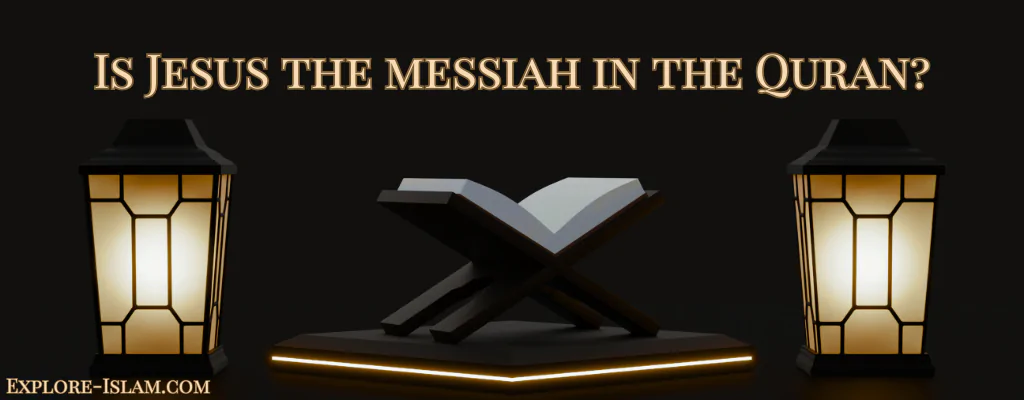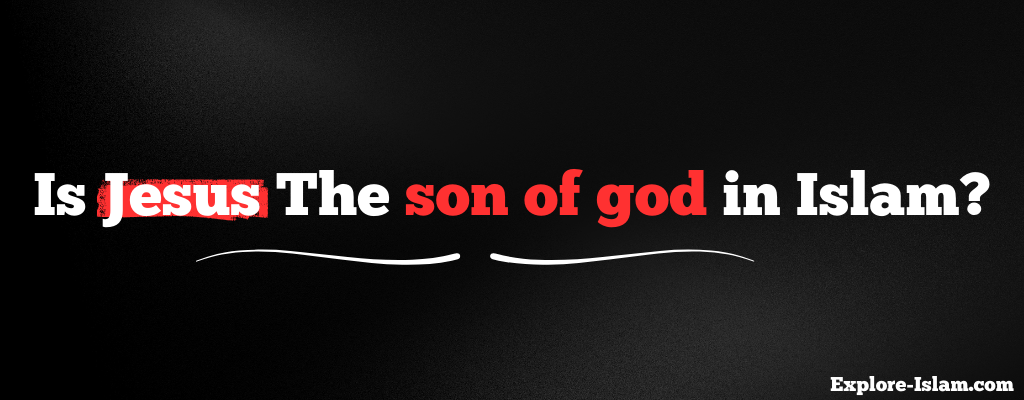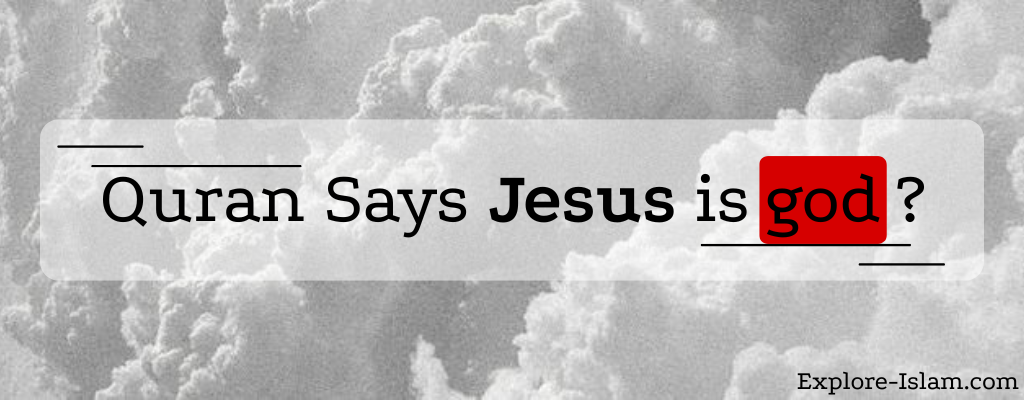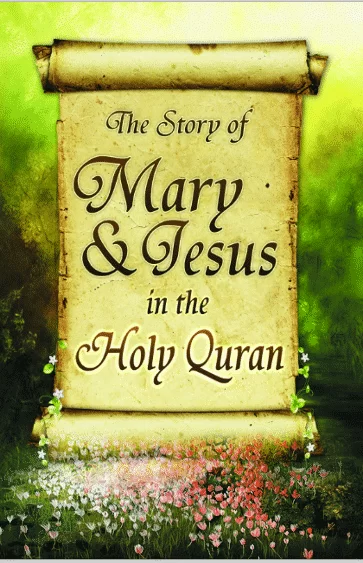Many people are surprised to know that Islam and Quran really, really respect Jesus, known as ‘Isa (عيسى) in Arabic. A common question is whether Jesus is referred to as the Messiah in the Quran, the short answer is yes, Jesus is called the Messiah in the Quran.
But to truly grasp what Messiah means in Quran, we need to see it from a Muslim perspective.
In Arabic we say “Al-Masih”. This is the word we look for. What does “Al-Masih” really mean? Why Jesus is called Messiah in Quran? We’ll read the verses called Jesus as the Messiah in the Quran carefully. and we’ll see what Islam say about this important name, “Messiah”.
Is Jesus Called the Messiah in the Quran?
Yes, Jesus is called the Messiah (Al-Masih المسيح) in the Quran. One clear example is in Surah Al-Imran (3:45):
“إِذْ قَالَتِ ٱلْمَلَـٰٓئِكَةُ يَـٰمَرْيَمُ إِنَّ ٱللَّهَ يُبَشِّرُكِ بِكَلِمَةٍۢ مِّنْهُ ٱسْمُهُ ٱلْمَسِيحُ عِيسَى ٱبْنُ مَرْيَمَ وَجِيهًۭا فِى ٱلدُّنْيَا وَٱلْءَاخِرَةِ وَمِنَ ٱلْمُقَرَّبِينَ”
“[And mention] when the angels said, “O Mary, indeed Allah gives you good tidings of a word from Him, whose name will be the Messiah, Jesus, the son of Mary – distinguished in this world and the Hereafter and among those brought near [to Allah]’
Surah Al-Imran (3:45)
This makes it pretty clear that Jesus is indeed called the Messiah in the Quran. Moreover, Jesus is called “al-Masih” multiple times in the Quran, not just once (we’ll present them all later).
However, the Quran points out to “Messiah” in a way that differs from the common interpretations found in other faiths, particularly Christianity.
So, what does Quran mean when refering to title Messiah?
What Does the Title “Messiah” in the Quran Point to?
The title “Messiah” in Quran points to Jesus’ specific role as a prophet sent to the Children of Israel. Jesus was “anointed” by Allah, meaning he was chosen and appointed for a divine mission: to guide his people back to the pure worship of one true God, to confirm what is right in the Torah, and to perform miracles as signs of his prophethood by Allah’s permission.
Jesus’ role as the Messiah in Islam is closely tied to his unique birth, life, and eventual return to earth before the Day of Judgment.
What is the Role of Jesus as the Messiah in the Quran?
Here are the most important points that illustrates Jesus’s role as the messiah in the Quran:
1. Messiah in Quran is a Prophet, Not Divine
Jesus was a human prophet sent to guide the Children of Israel (Bani Isra’il بني إسرائيل). He never claimed divinity, instead calling people to worship Allah alone.
Al-Masih came to correct deviations from the true path. He warned against false beliefs and called people back to the pure worship of the one God, Allah. He firmly rejected any claims of his own divinity.
2. Messiah in Quran is a Sign for Humanity and Performing Miracles by Allah’s Will
His miraculous birth and his miracles serve as signs of Allah’s power.
3. Messiah in Quran is a Foreteller of Comming of Prophet Muhammad
As the Messiah, Jesus brought the Injil (الإنجيل) or Gospel, a revelation full of wisdom and guidance for his people. He proclaimed the good news of a coming messenger, as mentioned in the Quran:
4. Messiah in Quran is a Witness in the Hereafter
The Quran also highlights that Jesus will bear witness to the truth and testify against those who deviated from his teachings:
In this role, Jesus will uphold the truth of monotheism and call out any distortions of his original message.
But, if Muslims don’t believe Jesus is divine, why is he still called the messiah?
Why Jesus is Called Messiah in Quran?
The answer lies in the rich Arabic language. The word al-Masih المسيح comes from the root masaha (مسح), which means “to anoint,” “to wipe,” or “to touch.”
And it’s from this simple root that Islamic scholars have drawn several interpretations for why Jesus is called Al-Masih:
1. Messiah Was Purified by Allah (مَسَحه, Masahahu)
Some scholars say Jesus was called Al-Masih because Allah masahahu (مسحه)—wiped him clean—purifying him from sins.
2. Messiah Was “Anointed With Blessing” (مُسح بالبركة, Musih bil-Barakah)
Others suggest that Jesus was musih (مسيح) because he was anointed with blessings (barakah). This reflects the divine favor and grace bestowed upon him.
3. Jesus’ ability to heal the sick and afflicted by touching them (مسح بيده, Masaha bi-Yadih)
Another interpretation is that Jesus earned this title because he would masah (يمسح)—wipe—his hand over the sick or disabled, and they would be healed by God’s permission.
There are other opinions also mentioned, such as that he traveled extensively, which relates to the word “مسح” (masaha) meaning “to traverse” or “to measure”. But the most common explanation among scholars is one of the three listed above.
4. Jesus’ Role in Islamic Eschatology
Another reason Jesus retains the title of Messiah in Islam is his role in Islamic eschatology (the study of the end times).
Jesus will return to Earth before the Day of Judgment. His return is seen as a time of justice and peace, where he will defeat the false messiah (Dajjal) and guide humanity back to the worship of the one true God.
The Prophet Muhammad (peace be upon him) said:
“By Him in Whose Hands my soul is, surely the son of Mary (Jesus) will soon descend among you as a just ruler…”
(Sahih al-Bukhari, 3448)
Which Verses Called Jesus as the Messiah in the Quran?
The Quran explicitly refers to Jesus as Al-Masih (المسيح), or “the Messiah,” in 9 verses. These verses not only affirm his title but also clarify his role as a prophet and servant of Allah.
1. The Quran Refers to Jesus as Messiah in Surah Al-Imran (3:45)
This verse is a beautiful announcement of Jesus’ birth. The angels tell Mary that her son will be called Al-Masih, a title that signifies his honored status in both this world and the next. It’s a reminder that Jesus was chosen by God for a special mission.
2. The Quran Refers to Jesus as Messiah in Surah An-Nisa (4:157)
Here, the Quran refutes the claim that Jesus was crucified or killed. Instead, it reaffirms his title as Al-Masih and emphasizes that Allah saved him, raising him to the heavens.
3. The Quran Refers to Jesus as Messiah in Surah An-Nisa (4:171)
This verse addresses the misconceptions about Jesus’ divinity. It calls him Al-Masih but clarifies that he is a messenger of Allah, not God Himself. It’s a powerful reminder of monotheism (tawhid توحيد) and the true nature of Jesus’ mission.
4. The Quran Refers to Jesus as Messiah in Surah An-Nisa (4:172)
This verse emphasizes Jesus’ humility and devotion as a servant of Allah. It refutes any notions of arrogance or divinity, presenting him as a model of submission to God.
5. The Quran Refers to Jesus as Messiah in Surah Al-Ma’idah (5:17)
This verse firmly rejects the idea of Jesus being divine. It uses his title Al-Masih to remind us that he, like all creation, is subject to Allah’s will and power.
6. The Quran Refers to Jesus as Messiah in Surah Al-Ma’idah (5:72)
Here, Jesus himself is quoted calling people to worship Allah alone, affirming his role as a guide who directs people toward monotheism.
7. The Quran Refers to Jesus as Messiah in Surah Al-Ma’idah (5:75)
This verse highlights Jesus’ humanity. Despite being Al-Masih, he was a prophet like those before him, and he and his mother, Mary, lived as ordinary humans who ate and drank.
8. The Quran Refers to Jesus as Messiah in Surah At-Tawbah (9:30)
This verse critiques the claim that Jesus is the son of Allah. While acknowledging his title as Al-Masih, it firmly rejects any notion of divinity.
9. The Quran Refers to Jesus as Messiah in Surah At-Tawbah (9:31)
This verse warns against elevating Jesus or others to the status of lordship. It reiterates that Al-Masih was sent to call people to worship the one true God.
Why the Differences Between the Islamic and Christian Views of Messiah Matter?
The differences between the Islamic and Christian views of Jesus as the Messiah have profound implications for how we understand Allah, our relationship with Him, and the path to salvation.
For Christians, belief in Jesus as the Son of God, his death, and resurrection is the cornerstone of their faith. It’s through faith in Jesus that they believe they attain salvation and eternal life.
For Muslims, salvation comes only through submission to the will of the One True God, following His commandments as revealed in the Quran, and striving to live a righteous life as exemplified by the prophets, including Jesus and Muhammad.
Worship is reserved for Allah alone, and no one, not even a prophet, can share in His divinity.
This Brings Us to the Conclusion That…
Basically, the Quran encourages us to really think about Jesus’ life and what he taught. Quran asks us to see him for who he truly was – a messenger of Allah, not God himself. By looking at how devoted he was to Allah, we can learn a lot.
It’s about searching for the truth honestly and openly, which can lead to peace, understanding, and a better connection with the Creator.
We invite you to learn more about Islam from reliable sources, from Islamic sources, not other sources that might distort the truth. Visit a mosque. Read an English translation of Quran. Ask questions to a good Muslim you know.
The wisdom of Islam is open to everyone who wants to find it.
May Allah guide all those seeking truth to His guidance and wisdom.











